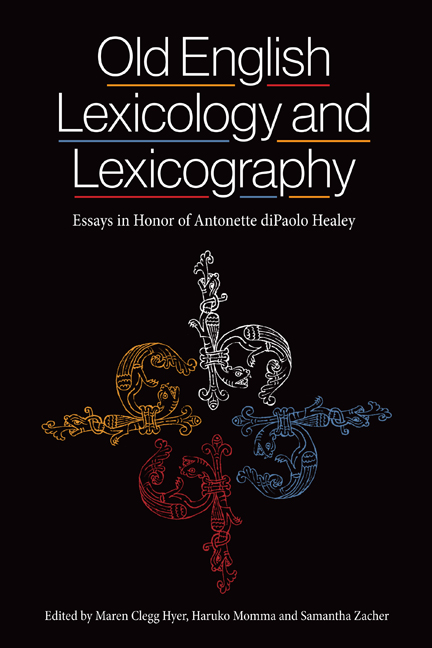Book contents
- Frontmatter
- Dedication
- Contents
- List of Illustrations
- List of Contributors
- Acknowledgements
- Abbreviations
- Introduction
- I Old English Poets and their Word-Craft
- 1 Beowulf and the Art of Invention
- 2 Juliana 53a Revisited (hætsð hæþenweoh)
- 3 Wounds and Compensation in the Old English Soul and Body Poems
- II Old English Homiletic Tradition
- 4 Defining and Redefining: Ælfric's Access to Gregory's Homiliae in Evangelia in the Composition of the Catholic Homilies
- 5 Lambeth Homily 4 and the Textual Tradition of the Visio Pauli
- 6 ‘A Vision of Souls’: Charity, Judgment, and the Utility of the Old English Vision of St. Paul
- 7 The Vocabulary of Sin and the Eight Cardinal Sins
- III Anglo-Saxon Institutions
- 8 The King (and Queen) and ‘I’: Self-Construction in Some Anglo-Saxon Royal Documents
- 9 Anglo-Saxon Maccabees: Political Theology in Ælfric's Lives of Saints
- 10 Nunne in Early Old English: Misogyny in its Literary Context
- IV Lexis of the Quotidian
- 11 Cingulum est custodiam: Semiotics and the Semantic Range of gyrdels
- 12 Island Time: The English Day and the Christian Hours
- 13 ‘Revising Hell’: The Voices of Teachers in Anglo-Saxon Studies and Anglo-Saxon England
- V The Task of the Lexicographer
- 14 Cryptography and the Lexicographer: Codifying the Code
- 15 Genre and the Dictionary of Old English
- Epilogue: Word-Hord
- 16 Reading Beowulf with Isidore's Etymologies
- An Old English Lexicon Dedicated to Toni Healey
- Toni Healey: A Tribute
- List of publications of Antonette diPaolo Healey
- Index
- Tabula Gratulatoria
- Miscellaneous Endmatter
- Anglo-Saxon Studies
10 - Nunne in Early Old English: Misogyny in its Literary Context
Published online by Cambridge University Press: 17 September 2020
- Frontmatter
- Dedication
- Contents
- List of Illustrations
- List of Contributors
- Acknowledgements
- Abbreviations
- Introduction
- I Old English Poets and their Word-Craft
- 1 Beowulf and the Art of Invention
- 2 Juliana 53a Revisited (hætsð hæþenweoh)
- 3 Wounds and Compensation in the Old English Soul and Body Poems
- II Old English Homiletic Tradition
- 4 Defining and Redefining: Ælfric's Access to Gregory's Homiliae in Evangelia in the Composition of the Catholic Homilies
- 5 Lambeth Homily 4 and the Textual Tradition of the Visio Pauli
- 6 ‘A Vision of Souls’: Charity, Judgment, and the Utility of the Old English Vision of St. Paul
- 7 The Vocabulary of Sin and the Eight Cardinal Sins
- III Anglo-Saxon Institutions
- 8 The King (and Queen) and ‘I’: Self-Construction in Some Anglo-Saxon Royal Documents
- 9 Anglo-Saxon Maccabees: Political Theology in Ælfric's Lives of Saints
- 10 Nunne in Early Old English: Misogyny in its Literary Context
- IV Lexis of the Quotidian
- 11 Cingulum est custodiam: Semiotics and the Semantic Range of gyrdels
- 12 Island Time: The English Day and the Christian Hours
- 13 ‘Revising Hell’: The Voices of Teachers in Anglo-Saxon Studies and Anglo-Saxon England
- V The Task of the Lexicographer
- 14 Cryptography and the Lexicographer: Codifying the Code
- 15 Genre and the Dictionary of Old English
- Epilogue: Word-Hord
- 16 Reading Beowulf with Isidore's Etymologies
- An Old English Lexicon Dedicated to Toni Healey
- Toni Healey: A Tribute
- List of publications of Antonette diPaolo Healey
- Index
- Tabula Gratulatoria
- Miscellaneous Endmatter
- Anglo-Saxon Studies
Summary
As the first study specifically dedicated to Old English references to nuns, this essay aims to assess how terms for ‘nun’ are used, particularly in the earlier Anglo-Saxon period. Recent research, particularly by Sarah Foot, as will be discussed below, has demonstrated the difficulty of establishing patterns for Old English vocabulary referring to Anglo-Saxon nuns. The lack of standardized monastic rules for earlier female houses and the complex chronological development of any existing monastic rules contribute to this difficulty. One area which has not yet been investigated is the corpus of references to non-Anglo-Saxon nuns, particularly that contained in the Old English translation of Gregory's Dialogues. The picture that emerges from this and other earlier texts is in many ways misogynistic in its connotations. The negativity associated with early literary representations of nuns may well have contributed to a tenth-century shift in the use of the relevant vocabulary.
Old English Vocabulary
One important research area in which the Dictionary of Old English and the Toronto Corpus have made important contributions is the charting of lexical change which occurred during the period in which Old English was in use. One example presenting quite drastic lexical change is the semantic field describing nuns. Old English presents a good range of vocabulary for ‘nun’, the general meaning of which could be defined as a devout woman living communally, having taken vows, and, in some cases, following a rule. The Old English Thesaurus lists munuc, mynecen(u), mynsterfæmne, nunfæmne, nunne, sweostor as belonging to this field. The vocabulary seems to vary greatly in its distribution and number of attestations in the Old English corpus. OE nunne, nonne, is an early loan from post-classical Latin nonna (‘nun’) and seems to have been the most widely used English term for ‘nun’ until the tenth century. Its use is not particularly frequent in the surviving Old English literature, however, with c. 120 occurrences. As the Toronto Corpus shows, what survives seems fairly polarized, with about a third of all attested cases occurring in a single text, Werferth's ninth-century Old English translation of Gregory's Dialogues. A related compound, nunfæmne, survives in the Dialogues only (eight occurrences).
- Type
- Chapter
- Information
- Old English Lexicology and LexicographyEssays in Honor of Antonette diPaolo Healey, pp. 159 - 172Publisher: Boydell & BrewerPrint publication year: 2020



